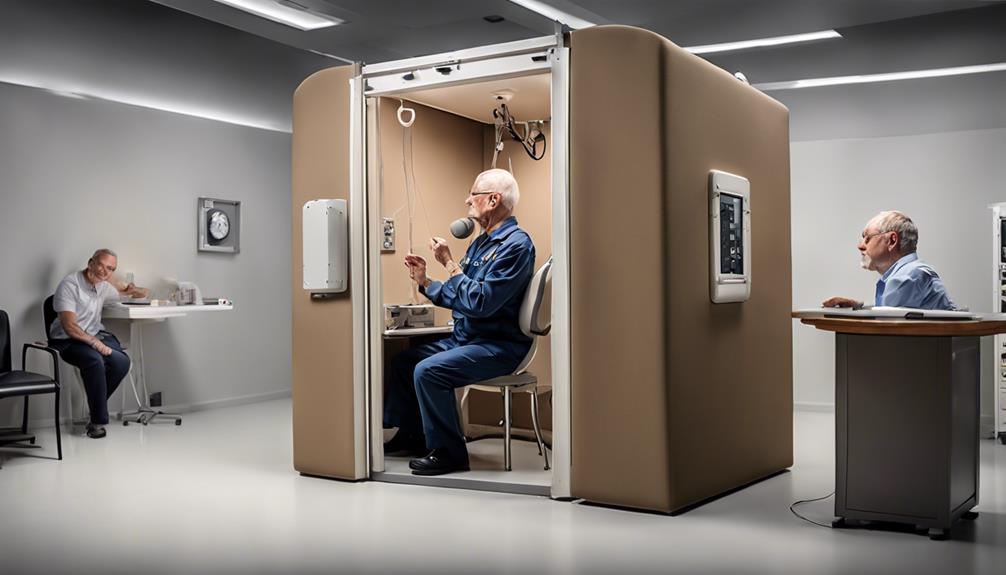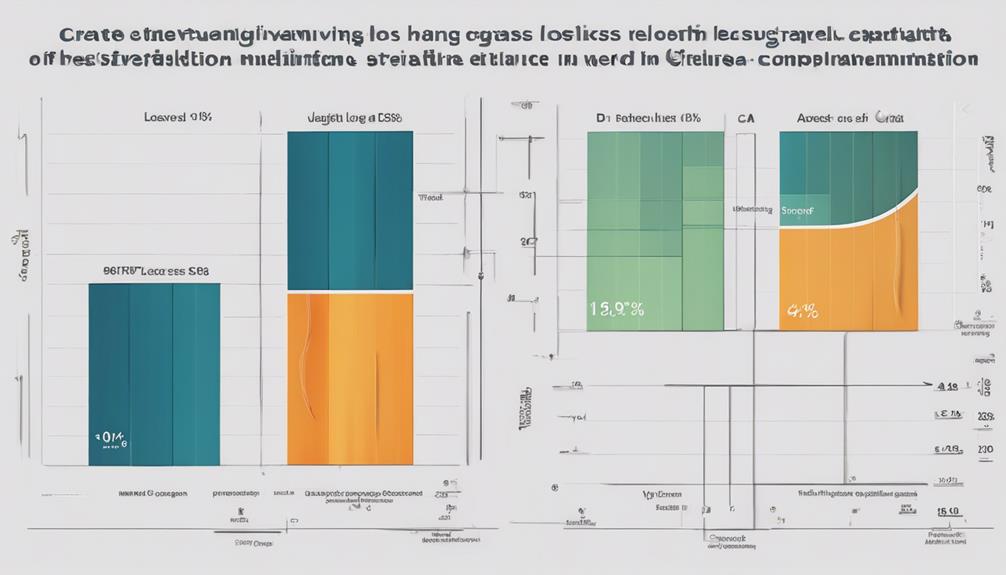Navigating the intricate landscape of VA Rating Criteria for Hearing Loss with Hearing Aids, imagine yourself at a crossroads where the clarity of sound can guide the way ahead.
The criteria for determining benefits and eligibility can seem like a puzzle waiting to be solved, each piece vital in securing the support our veterans rightfully deserve.
Exploring how hearing aids intersect with VA ratings holds a key to unlocking crucial assistance, but the journey is far from over.
Stay tuned to uncover the nuances that shape this pivotal aspect of veterans' healthcare.
Key Takeaways
- VA ratings consider how hearing aids improve communication and quality of life.
- Severity of hearing loss and functional limitations impact disability ratings.
- Hearing aid use influences speech discrimination and pure tone thresholds for ratings.
- Veterans with service-connected hearing loss may qualify for free hearing aids and comprehensive services.
VA Rating Criteria Overview
Analyzing the impact of hearing loss with hearing aids, the VA utilizes a disability rating system ranging from 0 to 100%. This system evaluates the effectiveness of hearing aids in enhancing communication and quality of life for veterans with service-connected hearing loss. The disability ratings consider the severity of hearing loss, the functional limitations it imposes, and the overall implications on daily life activities. Even with the use of hearing aids, veterans may still be eligible for disability compensation based on the extent of their hearing impairment.
The VA recognizes that hearing aids play a crucial role in managing hearing loss and may influence the need for ongoing support and services. By taking into account the functional limitations and social consequences of hearing loss with hearing aid use, the VA aims to ensure that veterans receive appropriate compensation that reflects the true impact on their well-being and quality of life.
Hearing Loss Evaluation Process

During the comprehensive evaluation process for hearing loss with hearing aids, certified audiologists administer tests such as pure tone audiometry and speech discrimination to assess the individual's hearing levels and the effectiveness of the hearing aids. These assessments provide crucial information on the extent of hearing loss and the impact of hearing aids on improving communication abilities. By analyzing the results, audiologists can tailor the settings of the hearing aids to meet the specific needs of the individual, ultimately aiming for optimal hearing improvement.
| Hearing Evaluation Tests | Purpose | Outcome |
|---|---|---|
| Pure Tone Audiometry | Measure hearing thresholds at different frequencies | Identify the degree and pattern of hearing loss |
| Speech Discrimination | Assess the ability to understand speech in noisy environments | Determine the individual's communication challenges |
| Follow-Up Evaluations | Monitor the ongoing effectiveness of hearing aids | Make necessary adjustments for continuous hearing improvement |
These evaluations are essential for enhancing the quality of life for individuals with hearing loss and ensuring that they receive the best possible care tailored to their unique requirements.
Impact of Hearing Aids on VA Rating
The impact of hearing aids on VA ratings for hearing loss is directly correlated with the documented improvements in hearing ability resulting from their use. When considering VA disability ratings, speech discrimination plays a crucial role, and hearing aids have the potential to enhance this aspect significantly.
Additionally, the use of hearing aids can lead to better puretone thresholds, which are essential in determining the severity of hearing loss for VA rating purposes. The effectiveness of fitted hearing aids in improving overall hearing capabilities is a key factor that influences VA disability ratings.
Properly functioning hearing aids can also contribute to improved sound perception, which is vital for individuals with hearing loss. Documented improvements in hearing ability with the use of hearing aids impact how VA rates an individual's hearing loss, highlighting the importance of utilizing these devices for better auditory outcomes and potential rating adjustments.
Specific VA Criteria for Hearing Loss

When assessing hearing loss for VA disability ratings, specific criteria such as diagnosis and etiology are pivotal factors considered by the VA to determine the level of impairment. The VA utilizes tests like the Maryland CNC Test and Puretone Audiometric Test to evaluate pure tone thresholds and speech discrimination. Veterans seeking disability benefits must present evidence linking their hearing loss to their military service. The severity of the condition determines the rating on a scale from 0% to 100%. The table below outlines the key criteria used by the VA in assessing hearing loss:
| Criteria | Description |
|---|---|
| Diagnosis | Medical identification of the type and extent of hearing loss. |
| Etiology | Determination of the cause or origin of the hearing impairment. |
| Maryland CNC Test | Evaluates speech recognition ability in noise. |
| Puretone Audiometric Test | Measures hearing sensitivity to different frequencies. |
| Evidence Linking | Providing proof connecting the hearing loss to military service. |
Understanding Disability Benefits
Understanding the benefits of disability compensation requires a thorough examination of the eligibility criteria and available support services provided by the Department of Veterans Affairs. Veterans with service-connected disability ratings for hearing loss are eligible to receive free hearing aids through the VA. Additional criteria for receiving free hearing aids include being a former POW, Purple Heart Recipient, or demonstrating a medical need.
The VA offers comprehensive services for veterans with hearing loss, encompassing hearing tests, evaluations, fittings for hearing aids, and ongoing support. Maintenance and support for VA-provided hearing aids are readily available through the VA healthcare system. Veterans have access to advanced hearing aid technologies that can significantly improve their quality of life by enhancing communication abilities.
Frequently Asked Questions
What Is the VA Rating for Hearing Loss With Hearing Aids?
We rate hearing loss with hearing aids based on residual impairment post-amplification. The effectiveness of prescribed devices determines ratings, ranging from 0% to 100% based on functional impact.
Utilizing hearing aids may influence the overall disability rating given by the VA. Eligibility for benefits remains for veterans with aids, factoring in remaining hearing loss.
What Is the VA Policy on Lost Hearing Aids?
We must promptly report lost hearing aids to our VA audiology clinic. Veterans are usually required to fill out a form and provide detailed information for replacement.
The VA typically covers the cost of replacing lost hearing aids for eligible veterans with service-connected hearing loss. Specific procedures and documentation must be followed as per VA requirements.
Our VA audiology clinics are well-equipped to assist us efficiently in the process of replacing lost hearing aids.
What Is Considered Hearing Loss?
When considering hearing loss, we focus on the impairment of one's ability to hear sounds effectively. This can manifest in various forms, including difficulty understanding speech, struggling in noisy environments, and withdrawing from conversations. Causes range from exposure to loud noises to genetic predispositions.
Proper diagnosis and service connection are vital for veterans seeking disability benefits related to hearing loss. Addressing these issues is essential for ensuring veterans receive the support they need.
Is 30% Hearing Loss a Disability?
Yes, 30% hearing loss is considered a disability by the VA. It entitles veterans to compensation and benefits due to the challenges it presents in understanding speech and communication.
The VA assesses hearing loss through specific criteria like speech discrimination and puretone thresholds. Veterans with a 30% hearing loss may benefit from hearing aids, which can improve their quality of life and communication abilities.
The VA offers support and resources to help veterans with this disability.
Conclusion
After delving into the VA rating criteria for hearing loss with hearing aids, it's clear that the process is comprehensive and aimed at providing veterans with the support they need.
The availability of advanced hearing aid technology through the VA demonstrates their commitment to improving the quality of life for veterans.
By following the specific criteria and seeking disability benefits, veterans can access the necessary resources to enhance their communication abilities and overall well-being.











